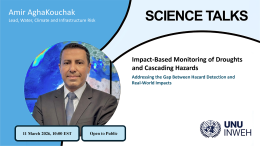As part of the Sharm el-Sheikh Climate Change Conference (COP27), UNU-IAS organised an event on 15 November 2022 that discussed transformative community-based climate action. Held at the COP27 Climate Action Hub, it presented innovative education for sustainable development (ESD) projects implemented by the global network of Regional Centres of Expertise on ESD (RCEs), a flagship initiative of UNU-IAS.
Opening the session, Philip Vaughter (Consultant, UNU-IAS) provided an overview of the global RCE network, which involves multiple actors in local contexts working together on integrated approaches to ESD in their communities. He explained that education could be a leverage point for climate action when going beyond knowledge to focus on action, and highlighted RCEs education projects that had been successful in shifting behaviours in areas such as carbon neutrality and low-carbon governance.
A UNU-IAS video was screened, presenting examples of RCE education projects on climate action together with comments from RCEs on their approaches and the impacts of their activities within their communities.
Diana Páez (Project Director, En Modo Acción — El Bosque University), shared a project of RCE Bogotá on the topic “Beginning in Bogotá: How urban youth can be an engine to achieve low-carbon sustainable lifestyles”. It created a movement, En Modo Acción, that is promoted by young leaders trained on the topic of sustainable lifestyles, to spread sustainability messages and advance initiatives that can foster sustainable cities. The movement sought to learn about the lifestyles of urban youth in the city through surveys and focus groups, finding that they wanted to have more sustainable lifestyles, but did not know how. It developed ways to spread these messages, using social media, events, workshops, and contests to engage with youth. By adopting more sustainable lifestyles, these initiatives led to a carbon footprint reduction after six to eight months, demonstrating that when people were informed of the impact of their actions, they could change their behaviour to live more sustainably.
Presenting RCE Denmark’s project Apprentices in Sustainability: Vocational training in wood as an element of sustainable construction methods, David Rangan (Project Developer — Sustainability, Knowledge Centre for Craftsmanship, Design & Architecture) highlighted the importance of supporting sustainable forest management. He explained how a group of carpenter apprentices in Copenhagen, Denmark, had learned how to build sustainably, laying the foundations for the start of the movement Apprentices for Sustainability. Trainers, technicians, apprentices, and scientists joined forces to develop a carpentry training programme, recognising that the global construction industry accounted for about 40% of all energy-related climate impacts, and used toxic and harmful substances. Reflecting on lessons learned from the project, Mr. Rangan noted empowerment was essential to support young people to develop their capacity to take action on sustainability. The project illustrates how research and education can find solutions for environmental problems in a local context, with further potential for contributing towards change at the global level.
In discussion the speakers considered how educators could learn from these cases presented. Dr Vaughter highlighted the stages of the projects, from pilot, to implementation, and then scaling up. Ms Páez explained the replication model, which could be implemented anywhere, while considering the context of the location. Mr Rangan emphasised developing actual competencies so that young people could feel competent to make a difference.


